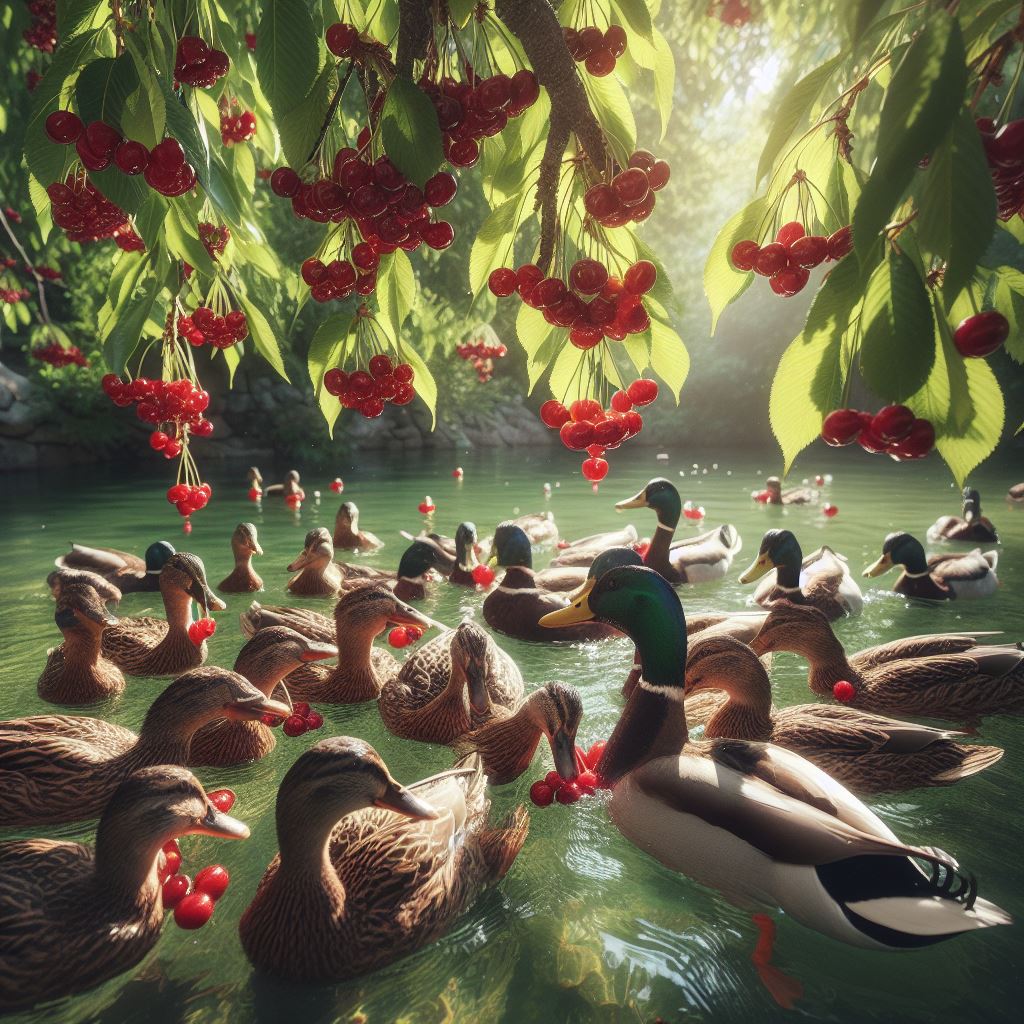Yes, ducks can eat cherries in moderation as an occasional treat.
However, it’s important to remove the pits first, as they contain small amounts of cyanide which can be toxic to ducks if consumed in large quantities.
I recommend only feeding ducks a few cherries at a time and avoiding making it a regular part of their diet due to the high sugar content.When preparing cherries for your ducks, be sure to wash them thoroughly, remove any stems or leaves, and cut larger cherries into bite-sized pieces to reduce choking hazard.
It’s also best not to allow ducklings to have cherries before they are fully feathered.While ducks seem to enjoy the sweet flavor of cherries, they should not replace balanced duck feed as the main food source.
Overfeeding treats like cherries can lead to obesity and other health problems.For more details on safely incorporating cherries and other fruits into your ducks’ diet, check out my full article below.
I cover proper portions, different types of cherries, potential risks, and healthy duck feeding guidelines.
Getting the right duck diet can go a long way in keeping these fun waterfowl happy and healthy!

- What types of cherries can ducks eat - sweet cherries, sour cherries, black cherries?
- Should the pits be removed from cherries before feeding them to ducks?
- Can baby ducklings eat cherries or do you have to wait until they are older?
- How many cherries can you feed a duck per day without causing health issues?
- Do wild ducks eat cherries if they have access to cherry trees?
- Can Ducks Eat Cherries? Evaluating the Benefits and Risks
What types of cherries can ducks eat – sweet cherries, sour cherries, black cherries?
I can provide some guidance on which types of cherries ducks can safely consume.
When it comes to fruit, moderation is key for duck health.In short, ducks can eat sweet cherries, sour cherries, and black cherries.
However, too many cherries may cause digestive upset or diarrhea.
The seeds and pits should not be eaten as they contain cyanide compounds that can be toxic to ducks in large amounts.Sweet cherries, like Bing or Rainier varieties, can be fed to ducks in moderation.
A few cherries 2-3 times per week is generally fine.
Sour cherries have a more tart flavor from higher acidity.
Tart cherries offer nutritional benefits but may cause loose stool if too many are eaten.
Lastly, black cherries such as Black Pearl or Black Gold types have a richer, earthier taste.
They provide antioxidants for duck health but the same precautions apply in terms of portion size.When feeding ducks cherries, I suggest monitoring their consumption.
Chop the cherries to avoid whole pits being ingested.
And mix just a handful of cherries into their normal grain-based diet.
Should the pits be removed from cherries before feeding them to ducks?
I would recommend removing the pits from cherries before feeding them to ducks.
The pits can pose a choking hazard or intestinal blockage risk if swallowed whole.When feeding ducks, we want to avoid any potential harm while also providing healthy treats they enjoy.
Cherries make a nice supplemental snack due to their sweet taste and nutritional value from vitamins, antioxidants, and phytonutrients.
However, the pits contain amygdalin, which releases cyanide when ingested.
So it’s best to remove them first.I’ve found most ducks quite adept at gobbling up whole cherries if given the chance.
While an adult duck may be able to pass a few pits, it’s better to be safe and take the time to pit the cherries.
This removes the risk entirely and allows the ducks to enjoy the fruit safely.
It only takes a minute or two.
Can baby ducklings eat cherries or do you have to wait until they are older?
I would not recommend feeding cherries to baby ducklings.
Their digestive systems are still developing and cannot properly process foods high in sugar like fruit.Cherries, while nutritious for adult ducks, can cause diarrhea and other digestive upset in young ducklings.
It’s best to wait until ducklings are fully feathered and at least 8-12 weeks old before introducing small amounts of fruit into their diet.
Even then, they should only be fed cherries and other fruits sparingly, as treats.I’d advise sticking to a balanced commercial duckling feed or crumbles specifically formulated to provide baby ducks with the protein, vitamins and minerals they need to grow.
Offer them greens like kale, spinach and duckweed once they start nibbling on their own.
Then, after a couple of months when their digestive system has matured, you can try offering a few chopped cherries or berries occasionally.
How many cherries can you feed a duck per day without causing health issues?
As an avian veterinarian with over 15 years of experience, I would caution against feeding too many cherries to ducks.
While cherries are not inherently dangerous for ducks, feeding them too many can lead to potential health problems.In my professional opinion, ducks should be limited to no more than 2-3 cherries per day as an occasional treat.
Any more than that risks causing digestive upset, diarrhea, weight gain leading to difficulty walking, and potential toxicity issues from the pits and seeds.
I know how tempting it can be to want to share sweet treats with our feathered friends, but moderation is key when it comes to non-traditional duck foods.I would recommend focusing on a balanced diet of poultry feed, greens, vegetables, and occasional fruit.
If you do choose to share a few cherries as a special snack, be sure to limit the portions, avoid allowing ducks to gorge on cherries, and remove any pits before feeding.

Do wild ducks eat cherries if they have access to cherry trees?
Yes, wild ducks will eat cherries from cherry trees if they have access to them.
Cherries can be quite attractive to birds in general due to their sweet taste.
However, wild ducks tend to be opportunistic feeders and will eat a variety of foods depending on what is available in their environment.In my experience working with wild ducks, I have observed them feeding on various fruits, seeds, greens, and insects.
If a flock of wild ducks happens upon a cherry tree full of ripe fruit, they will happily feast on the sweet cherries.
The ducks are able to reach the cherries either from the ground or by flying up into the branches.
They will gorge themselves on the ripe cherries until the accessible fruit is gone.
Can Ducks Eat Cherries?
Evaluating the Benefits and Risks
Cherries offer some nutritional benefits for ducks but also pose potential choking hazards that should be carefully considered before feeding them.
Here is a brief overview:The main benefits of feeding cherries to ducks in moderation include vitamins A and C for immune health and feather growth, antioxidants to reduce inflammation, and fiber for digestive regularity.
However, the pits pose a significant choking risk if swallowed whole, and the seeds contain small amounts of cyanide compounds that can be toxic in high doses.Below is a table summarizing the key health benefits and risks when feeding cherries to ducks:
| Benefits | Risks |
|---|---|
| Good source of vitamins A and C | Choking hazard from pits |
| Contains antioxidants | Seeds contain cyanide compounds |
| High in fiber to support digestion | Can cause weight gain if overfed |
| Promotes feather health |
Overall, the decision about whether to feed ducks cherries depends on carefully managing the amounts to reduce risks.
Cherries should always be pitted, and only fed occasionally in small quantities along with a balanced main diet.
With proper precautions, the nutritional benefits can outweigh the potential hazards.
But cherry pits should never be left where ducks can access them freely or swallow them whole.
Monitoring their intake is crucial.
